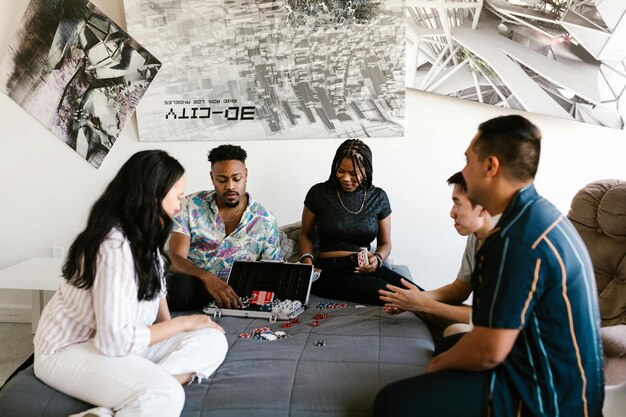Collegiate Esports: US Rise, Opportunities & Challenges

The rapid growth of collegiate esports in the US presents significant opportunities for student-athletes and universities, fostering community and skill development, while also facing challenges related to funding, infrastructure, and academic balance.
The landscape of competitive gaming has undergone a dramatic transformation, and nowhere is this more evident than in the burgeoning world of collegiate esports. The Rise of Collegiate Esports in the US: Opportunities and Challenges offers a compelling narrative of growth, innovation, and the evolving perception of gaming within academic institutions, pushing boundaries and redefining what it means to be a student-athlete.
The Ascendance of Collegiate Esports: From Club to Varsity Sport
Collegiate esports has evolved significantly from informal student clubs to formalized varsity programs, mirroring the growth of traditional sports. This transformation reflects a broader societal recognition of esports’ legitimacy and its potential as a competitive and educational endeavor. Universities are increasingly investing in dedicated gaming facilities, coaching staff, and scholarship opportunities, signaling a profound shift in academic priorities.
Early Beginnings and Grassroots Growth
Initially, collegiate esports programs were largely student-led initiatives, driven by passionate gamers organizing informal tournaments and gatherings. These early efforts laid the groundwork for the more structured programs seen today.
- Informal gaming meetups on campus
- Student-run clubs and organizations
- Community-driven tournaments and events
These grassroots movements demonstrated the fervent interest and latent talent within the student body, eventually drawing the attention of university administrators who recognized the potential for engagement and outreach.
Institutional Recognition and Investment
As the popularity of esports surged, universities began to acknowledge its potential value. This recognition led to increased institutional support, transforming casual clubs into official varsity programs with dedicated resources.
- Establishment of official esports departments
- Hiring of full-time coaches and staff
- Allocation of budgets for equipment and travel
This shift from informal to institutionalized status is a critical milestone, reflecting a mature understanding of esports’ place within the academic framework.
The progression from fragmented, student-led groups to cohesive, university-backed teams is a testament to the undeniable appeal and competitive viability of collegiate esports. This institutional embrace provides a stable foundation for growth, allowing programs to expand their reach and attract a wider talent pool, ultimately shaping the future of competitive collegiate gaming.
Untapped Opportunities for Student-Athletes
For student-athletes, collegiate esports presents a unique blend of competitive gaming and academic pursuit, opening doors to opportunities that were unimaginable a decade ago. These opportunities extend beyond mere gameplay, encompassing personal, professional, and educational development.
Scholarship Pathways and Academic Support
One of the most significant opportunities is the availability of esports scholarships, which can alleviate the financial burden of higher education. Many universities now offer partial or full scholarships to talented esports players.
Beyond financial aid, student-athletes often receive academic support tailored to their needs. This includes access to study halls, tutors, and flexible scheduling to accommodate practice and competition times, ensuring academic success alongside competitive pursuits.
Skill Development Beyond Gaming
Participation in collegiate esports fosters a wide array of transferable skills that are highly valued in the modern workforce.
- Teamwork and Communication: Effective strategy execution requires seamless coordination.
- Problem-Solving and Critical Thinking: Adapting to dynamic game situations hones analytical abilities.
- Leadership and Sportsmanship: Role-playing within a team cultivates leadership qualities.
- Time Management: Balancing academic demands with practice schedules is crucial.
These skills are not confined to the virtual arena; they are applicable across diverse professional fields, preparing students for careers post-graduation, whether in esports or other industries.
Career Prospects within the Esports Ecosystem
The collegiate esports landscape serves as a pipeline for careers in the broader esports industry. Students gain invaluable experience and networking opportunities, leading to diverse professional roles.
Possible career paths include:
- Professional player or coach
- Event organizer or broadcast producer
- Marketing and social media specialist
- Game developer or analyst
These burgeoning career avenues highlight the economic potential of the esports industry, providing a tangible return on investment for student-athletes and universities alike. The holistic development offered by collegiate esports programs ensures that participants are not just skilled gamers, but well-rounded individuals ready for future challenges.

Navigating the Challenges: From Funding to Legitimacy
Despite its rapid growth, collegiate esports faces a variety of challenges that must be addressed for its sustained success and integration into the academic framework. These hurdles range from financial complexities to societal perceptions and systemic limitations.
Securing Adequate Funding and Resources
Funding remains a significant challenge for many university esports programs. Unlike traditional sports with established revenue streams, esports programs often rely on institutional support, sponsorships, and donations.
The cost of high-performance equipment, dedicated gaming spaces, coaching salaries, and travel expenses for competitions can be substantial. Universities must carefully balance these expenditures with other academic and athletic priorities.
Establishing Infrastructure and Facilities
Creating and maintaining state-of-the-art esports facilities is another major hurdle. These spaces require specialized equipment, high-speed internet, and ergonomic setups to support competitive play and academic pursuits.
- Designing dedicated gaming arenas and practice rooms
- Investing in high-end PCs, monitors, and peripherals
- Ensuring robust network infrastructure and cybersecurity
Many institutions are still in the early stages of developing such infrastructure, leading to disparities in the quality of programs across the country.
Addressing Academic Balance and Player Well-being
Balancing the rigorous demands of competitive gaming with academic responsibilities is a constant challenge for student-athletes. Universities must implement support systems to prevent burnout and ensure academic success.
- Providing academic advising and tutoring services
- Promoting mental health resources and support
- Encouraging healthy lifestyle habits and physical activity
The intense training schedules and travel requirements associated with esports can inadvertently lead to academic neglect or mental health issues if not properly managed. Ensuring student well-being is paramount for the longevity of collegiate esports.
Furthermore, gaining full legitimacy and acceptance within the broader academic and athletic communities can be an uphill battle. Some still view esports as merely “playing video games,” underestimating the skill, strategy, and dedication required. Overcoming these misconceptions is crucial for integrating collegiate esports fully into the institutional fabric.
The Role of governing bodies and Conferences
The maturation of collegiate esports has necessitated the emergence of governing bodies and dedicated conferences, providing structure, legitimacy, and competitive frameworks. These organizations play a vital role in standardizing rules, fostering fair play, and promoting growth within the collegiate ecosystem.
National Association of Collegiate Esports (NACE)
NACE is widely recognized as a leading organization in the collegiate esports space, setting standards and advocating for programs across the US. It provides a platform for universities to connect, share best practices, and collaborate on the development of esports within higher education.
NACE offers:
- Guidance on program development and compliance
- Resources for coaches and administrators
- Opportunities for intercollegiate competition
Its role is pivotal in establishing a unified voice for collegiate esports and ensuring its continued professionalization.
Conference-Specific Leagues and Operations
Beyond national organizations, many traditional athletic conferences are beginning to integrate esports into their offerings. This provides a more localized and often more competitive environment for teams within specific regions.
Examples include:
- Big Ten Conference’s involvement in esports
- The establishment of dedicated esports conferences
- Regional tournaments and championships
These conference-specific leagues often leverage existing athletic department infrastructure, streamlining operations and providing familiar competitive structures for universities and student-athletes.
The establishment of these governing bodies and conferences provides a clear pathway for universities to engage with collegiate esports in a structured and legitimate manner. They not only facilitate competition but also advocate for the sport, ensuring its ethical growth and providing official recognition to a rapidly expanding field.
Technology and Innovation Driving Esports Forward
Technological advancements are at the heart of collegiate esports’ explosive growth, continually pushing the boundaries of what is possible within competitive gaming. From sophisticated hardware to advanced analytics, technology is an indispensable driver of innovation and performance.
State-of-the-Art Gaming Hardware and Software
High-performance gaming equipment is foundational to collegiate esports, enabling players to compete at the highest levels without technological limitations. Universities are investing in cutting-edge PCs, monitors, and peripherals.
Beyond hardware, advancements in game engine design and software optimization enhance the competitive experience. This includes:
- Higher refresh rates for smoother gameplay
- Reduced input lag for precise control
- Sophisticated anti-cheat software for fair competition
These technological improvements ensure a level playing field and allow players to fully demonstrate their skill.
Streaming and Broadcasting Technologies
The ability to stream and broadcast esports events has been crucial in expanding its audience and building a vibrant spectator culture. Collegiate programs leverage platforms like Twitch and YouTube to showcase their competitions.
Advanced broadcasting technologies include:
- High-definition cameras and professional-grade switchers
- Real-time data overlays and analytical tools for viewers
- Customizable virtual sets and augmented reality elements
These technologies transform game streams into immersive entertainment experiences, attracting fans and sponsors alike, and elevate the profile of collegiate esports.
Data Analytics and Performance Optimization
The application of data analytics in esports mirrors its utility in traditional sports, providing invaluable insights for player and team performance. Coaches and analysts use data to refine strategies and identify areas for improvement.
Key applications include:
- Tracking player statistics and in-game performance metrics
- Analyzing opponent strategies and tendencies
- Developing personalized training regimens
This data-driven approach to coaching and player development is revolutionizing how collegiate teams prepare for and compete in esports, giving them a competitive edge and fostering a more scientific approach to training.
In essence, technology is not merely a tool in collegiate esports; it is an integral component that shapes the competitive landscape, enhances the viewer experience, and drives continuous innovation. Its evolution is intrinsically linked to the future trajectory of the sport.

Community Building and Inclusivity in Collegiate Esports
Beyond the competitive aspect, collegiate esports is a powerful vehicle for community building and fostering inclusivity on university campuses. It provides a welcoming environment for students who might not otherwise find their niche in traditional collegiate activities, promoting diverse engagement and a sense of belonging.
Fostering a Sense of Belonging
For many students, esports offers an immediate connection point, allowing them to bond over shared passions and form strong social networks. This is particularly beneficial for students who may feel marginalized by conventional sports or social groups.
Universities are actively creating spaces where students can feel comfortable expressing their interests and connecting with like-minded peers, reducing isolation and enhancing the overall campus experience.
Promoting Diversity and Inclusion
Esports tend to be inherently more inclusive than many traditional sports, as physical attributes are less of a barrier to participation. This opens the door for a diverse range of student-athletes, regardless of gender, physical ability, or background.
Program leaders are often intentional about:
- Encouraging participation from underrepresented groups
- Creating a respectful and welcoming competitive environment
- Addressing issues of toxicity and harassment within gaming communities
By actively promoting diversity, collegiate esports can serve as a model for broader inclusivity within universities, demonstrating how varied talents can come together for a common goal.
Connecting with the Wider University Community
Esports programs also serve as a bridge between the niche gaming community and the wider university body. Through campus tournaments, viewing parties, and open gaming sessions, they can engage non-gamers and showcase the excitement and strategic depth of competitive gaming.
This engagement leads to:
- Increased student attendance at esports events
- Cross-disciplinary collaborations with academic departments
- Enhanced university pride and community spirit
The collective experience of supporting a university esports team can be as unifying as cheering for a traditional football or basketball team, demonstrating its potential for widespread campus appeal and community cohesion.
In conclusion, the community-building and inclusive nature of collegiate esports goes beyond the competitive arena. It transforms campuses into more vibrant, connected, and welcoming places, reinforcing the idea that gaming is not just a pastime but a legitimate and valuable form of engagement and identity.
Future Outlook: Growth, Professionalization, and Integration
The future of collegiate esports in the US appears bright, characterized by continued growth, increased professionalization, and deeper integration into the academic and athletic fabric of universities. The trajectory suggests an evolution towards a more recognized and valuable component of higher education.
Continued Expansion of Programs
The number of universities offering varsity esports programs is expected to continue rising. As more institutions recognize the benefits, from student recruitment to brand visibility, the competitive landscape will become even more robust.
This expansion will likely lead to:
- More scholarship opportunities for student-athletes
- Increased investment in cutting-edge facilities
- A broader array of game titles supported at the collegiate level
Such growth will solidify collegiate esports as a mainstream activity within higher education.
Greater Professionalization and Standardization
As the industry matures, there will be an emphasis on greater professionalization, mirroring the structured approach of traditional sports. This includes refining coaching methodologies, player development pathways, and competitive regulations.
Expect to see:
- More comprehensive coaching certifications
- Standardized player contracts and compensation models
- Enhanced ethical guidelines and anti-doping policies tailored for esports
This standardization will reinforce the credibility and long-term viability of collegiate esports, ensuring fair play and athlete welfare.
Deeper Integration with University Curriculums
Beyond competitive play, esports is increasingly finding its way into academic curriculums. Universities are developing courses and even degree programs related to game design, esports management, broadcasting, and analytics.
This integration provides:
- Pathways for students interested in careers in the esports industry
- Opportunities for interdisciplinary research and collaboration
- A stronger academic foundation for the entire field of esports
By bridging the gap between competitive play and academic study, universities are preparing the next generation of esports professionals and leaders.
Ultimately, the trajectory of collegiate esports in the US points towards an era where it is not just an extracurricular activity but a fully recognized and celebrated aspect of university life, offering significant educational, competitive, and professional value to its participants and institutions.
| Key Aspect | Brief Description |
|---|---|
| 🎮 Program Growth | Collegiate esports is rapidly expanding from clubs to varsity sports with institutional support. |
| 💰 Opportunities | Scholarships, skill development, and career paths exist within the burgeoning esports industry. |
| 🚧 Challenges | Funding, infrastructure, and ensuring academic balance are key hurdles. |
| 🤝 Community & Tech | Esports builds inclusive communities, driven by constant technological innovation and analytics. |
Frequently Asked Questions
▼
Collegiate esports refers to organized, competitive video gaming at the university level, often with support from the institution. It includes varsity programs, club teams, and formalized competitions between colleges, similar to traditional sports, and offers academic and competitive opportunities for student-athletes across various game titles.
▼
Yes, many universities in the US now offer scholarships for collegiate esports players. These scholarships can range from partial tuition waivers to full-ride opportunities, depending on the institution and the student’s skill level. Availability varies by program, so prospective student-athletes should research individual university offerings.
▼
Benefits include scholarship opportunities, development of transferable skills like teamwork, communication, and strategic thinking, and pathways to careers within the growing esports industry. Participants also gain a strong sense of community and belonging, balancing academic pursuits with high-level competitive gaming in a structured environment.
▼
Collegiate esports programs face several challenges, including securing consistent funding, establishing and maintaining adequate high-tech infrastructure, and finding a balance between rigorous training schedules and academic demands. Additionally, some programs work to overcome perceptions that esports is not a legitimate collegiate activity, striving for full institutional and athletic recognition.
▼
Collegiate esports in the US is primarily governed by organizations like the National Association of Collegiate Esports (NACE), which provides guidelines, resources, and competitive structures. Additionally, some traditional athletic conferences are integrating esports into their operations, and various independent leagues and tournament organizers contribute to the overall competitive landscape, ensuring fair play and player support.
Conclusion
The journey of collegiate esports in the US from nascent student clubs to formalized varsity programs underscores a significant shift in the educational and competitive landscape. While the myriad opportunities for student-athletes—from scholarships to career pathways and invaluable skill development—are undeniable, navigating the challenges of funding, infrastructure, and the continuous pursuit of academic balance remains critical. The ongoing efforts of governing bodies, coupled with technological advancements and a commitment to inclusivity, paint a picture of a future where collegiate esports is not just a burgeoning phenomenon but a deeply integrated, highly valued, and professionally recognized component of higher education, continually evolving and redefining the boundaries of competition and learning.





